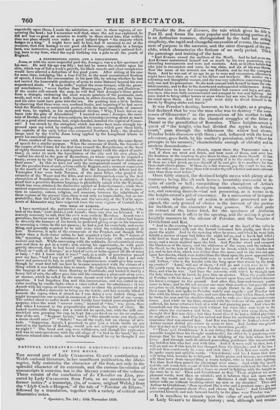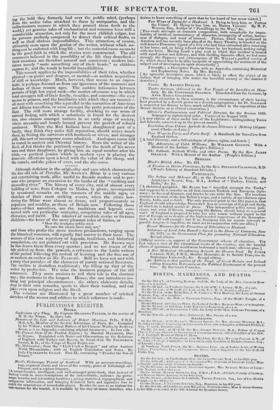NATIONAL LITERATURE—THE DABINOGION: LEGENDS OF THE RHINE.
THE second part of Lady CHARLOTTE Gunsfs contribution to Welsh national literature, in her munificent publication, the Arabi- nogion, fully maintains the character of the first, not only in the splendid character of its externals, and the curious the-similes of manuscripts it contains, but in the literary contents of the volume. These consist of the conclusion of Le Chevalier an Lion, pro- cured by Lady CHARLOTTE from Paris, as we mentioned in our former notice ;* a transcript, (in, of course, original Welsh,) from the " Llyfr Coch o Hugest," of the talc of "Peredur ab Efrawc," followed by a translation, together with a variety of critical and illustrative notes.
* Spectator, No. 541; 10th November 1838. Peredur the Son of Byrom, the tale which gives its title to Part II. and forms the most popular and interesting portion of k is an Arthurian romance, distinguished by the bald but striking simplicity, the rapid and changeful succession of events' the earnett. ness of purpose in the narrator, and the utter disregard of the pos. sible, which characterize the fictions of an early period. This it the parentage and training of the hero. " Earl Evrawc owned the earldom of the North. And he had seven Rm. And Evrawc maintained himself not so much by his own possessions, as by attending tournaments and wars and combats. And, as it often befalls thou who join in encounters and wars, he was slain, and six of his sons likswia, Now the name of his seventh son was Peredur, and he was the youngest them. And he was not of an age to go to wars and encounters, otherwise he niight have been slain as well as his fifther and brothers. His mother mu a scheming and thoughtful woman, and she was very solicitous concerning this he only son and his possessions. So she took counsel with herself to leave the inla. bited country, and to flee to the deserts and unfrequented wildernesses, kabala permitted none to bear her company thither but women and buys, and spirit. less men, who were both unaccustomed and unequal to war and lighting. And none dared to bring either horses or arms where her son was, lest he Zooid* his mind upon them. And the youth went daily to divert himself in the forest, by flinging sticks and staves."
It was Peredur's destiny, however' to be a knight, as a prophecy had declared that he was the man who was to destroy " the some. resses of Gloucester ;" so the precautions of his mother to baffle fitte were as fruitless as the classical struggles of the fitther of Dame or the grandfitther of Romulus. Three knights-errant in quest of " the knight, who had divided the apples in „Arthur's court," pass through the wilderness the widow had chosen; Peredur holds discourse with them ; and, inflamed with the love of adventure, goes forth, by his mother's permission, with " these few precepts in his memory," characteristic enough of chivalry and its modern descendants- " Wherever thou seest a church, repeat there thy Paternoster unto it. And if thou see meat and drink, and bast need of them, and none hare the kindness or the courtesy to give them to thee, take them thyself. If that hear au outcry, proceed towards it, especially if it he the outcry of a woman. if thou see a fide jewel, po:sess thyself of it, and give it to another ; for thus thou shalt obtain praise. If thou see a fair woman, pay thy court to her, wile- timer she will or no; for thus thou wilt render thyself a better and more esteemed man than thou mist before."
Once titirly started, the destined knight meets with plenty dad. ventures; being, like all such heroes, invariably successful in de. spite of earth or hell ; vanquishing the champions of Arthur's court, 'subduing giants, destroying monsters, smiting the oppres. sor, and rescuing damsels—but not possessing, as it seems to us, the knight-errant's giit of constancy. In a succession of independ- mit events, where unity of action is neither preserved nor de. signed, the only ground of choice is the interest of the pavan- lar incident, or the character it may possess. We shall prefer an extract of the latter kind, for the specimen of' Arthurian literary ornament it offers in the opening, and the notion it gives of knightly manners in the silence of Peredur, and the remarks of Gwalchmai and Kai.
" And in the evening he entered a valley, and at the heal of the valley he came to a hermit's cell, mid the hermit welcomed him gladly, and there he spent the night. And in the morning when he arose, :out e:lien lie went forth, behold a shower of snow had Wien the night bd. ae, and a hawk had killed a wild fowl in front of the cell. And flue noise of the horse scared the hawk away, and a raven alighted upon the bird. And Peredur stoo.i and compared the blackness of the raven, and the whiteness or the snow, and the redness of the blood, to the hair of the bay that best he loved, which was blacker than jet, and to her skin, which was whiter than the snow, and to the two red spots upon her cheeks, which were redtler than the blood upon the slimy appeared tote. " Now Arthur and his household were in search of Peredur. • Know ye,' said Arthur, ' who is the knight with the long spear that stands by the brook up yonder ?" Lord,' said one of them, ' I will go and 1.2:1;11 iv tot he is.' SD the youth came to the place where Peredur was, and asked him what lie did thus, and who he was. And from the intensity with which he thought upon the holy whom best lie loved, he gave him no answer. Then the youth thrust at Peredur w:th his lance ; and Peredur turned urn him, tool struck him over his horse's crupper to the ground. And after t limr-and-twenty youths came to him; and he did not auswer one more than another, hut gave the same reception to all, bringin,g them with one single thrust to the ground. And then came Kai, and spoke tim Peredur rudely and angi ily ; and Peredur took him with his lance Wider the jaw, and east him from him with a thrust, so that lie broke his arm and his shoulder-blade, mid he rode over hini one-and-twenty times. And while he lay thus, stunned with the violence of the pain that he suffered, his horse returned back at a wild and prancing pave. And when the household saw the horse come lock without his rider, they rode forth to the place where the encounter hod been. And when they first came there, they thought that Kai was shalt; but they found that if he haul a physician, he might yet live. And Peredur moved not from his meditation on seeing the * concourse that was around Kai. And Kid was brought to Arthur's tent, and Arthur caused skilful plivicians to came to him. And Arthur was grit:yell that Kai had met with this reverse, for he loved him greatly. " "rhen,' said Gwalelimai,' it is not fitting that any should disturb an ho- nourable knight from his thought unadvisedly; for either he is ponderiug some damage that he has sustained, or he is thinking of the lady whom best he loves. And through such ill-advised proceeding, lucid Litre this misadventure has befallen him who last met with him. Audit' it sec it well to thee, limb I will go and see if tide knight has changed front his thought ; and if he has, I will ask him courteously to came and visit thee.' Then Kai was wroth, and he spoke angry and spiteful words. ' Gwalehmai,' said Ile, I know that thou wilt bring him, because he is Ilitigued. Little praise ;old honour, nevertheless, wilt thou have from vanquishing a weary k uig it, who is tired with fighting. Yet thus bust thou gained the advantage over many. And while thy speech and thy soft words last, a coat of thin linen were armour sufficient for thee, anti thou wilt not need to break eitlwr lance or sword in fighting with the knight in the state he is in."rhen said Gwalchmai to Kid, "rhou mightest use more pleasant words, wert thou so minded ; and it behoves thee not upon nie to wreak thy wrath and thy displeasure. Methinks I shall bring the knight hither with inc without breaking either Iry arm or my shoulder."rhen said Arthur to Gwalchund, ' thou speakest like a wise and a prudent man ; go, tual take enough of urmour about thee, and choose thy horse.' And Gwalehrunt accoutted himself, and rode forward hastily to the place were Peredur was." It is needless to remark upon the value of such publications as Lady GUEST'S to literary history ; and, although not retata- jog the hold they formerly had over the public mind, (perhaps from the undue value attached to them by antiquaries, and the indiscriminate manner in which they poured them forth to the world,) yet genuine tales of enchantment and romance have still a considerable attraction, not only for the most childish vulgar, but for persons perfectly competent to detect their critical faults, as well as their obvious impossibilities. This attraction, of course, ultimately rests upon the genius of the writer, without which no- thing can be endowed with long life ; but the material cause seems to be the good faith in which the stories were constructed. The old romancers believed in the possibility of the life they described— their creations are therefore natural and consistent ; modern imi- tators merely "make something out of their heads," as children express it ; and the result is hateful ineredibilities. This remark applies to the impossibilities of their tales, whether physical—as giants and dragons, or mental—as sudden acquisition of skill or knowledge. Much, however, that seems to us impro- bable, is perhaps deemed so from our ignorance of the manners and feelings of those remote ages. The sudden intimacies between persons of high but equal rank—the matter-of-course way in which total strangers tell oftheir family, troubles, and concerns—the easy access to princes, and the fitmiliarity with which they are treated— all meet with something like a parallel in the narratives of American and African travellers, or even amongst the petty potentates of the East. The still more strange facility, shocking to our sense of natural feeling, with which a substitute is found tbr the dearest ties, also obtains amongst nations in an early stage of society, where necessity and hourly hazard prevent the growth of refined sentiment. When the Red Indians have slaughtered part of a family, they think they make full reparation, should mercy touch them, by finding the survivors with husbands or wives; and stranger still, this sort of recompense seems admitted. Analogous cases will be traced in ancient and Oriental history. Even the writer of the Book of' Job thinks the patriarch repaid for the death of his seven sons and three daughters, by giving him an equal number after his trials,—a poetical justice which in modern eyes is placing the domestic affections upon a level with the value of the sheep, and the camels, and the yokes of oxen, and the she-asses.



























 Previous page
Previous page